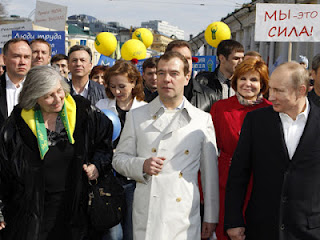Tricky words
 Alexander Golts wrote a wrap-up for the first week in May called "A Soviet Man in the Postmodern Era". It was first published in Yezhednevnyj Zhurnal, but I can't find it on their website, so here's a link to a reprint at Dvizhenie vmeste (Moving together)'s site. It's a pretty biting look at the tandem's takeover of Russia's holidays (including a jab at how the country's honor, so important on Victory Day, doesn't suffer from having so many WWII vets homeless, or as good as), and it has some nice cultural bits for translation students to wrestle with, as well as some syntactic puzzles. Here are two very different things my students struggled with.
Alexander Golts wrote a wrap-up for the first week in May called "A Soviet Man in the Postmodern Era". It was first published in Yezhednevnyj Zhurnal, but I can't find it on their website, so here's a link to a reprint at Dvizhenie vmeste (Moving together)'s site. It's a pretty biting look at the tandem's takeover of Russia's holidays (including a jab at how the country's honor, so important on Victory Day, doesn't suffer from having so many WWII vets homeless, or as good as), and it has some nice cultural bits for translation students to wrestle with, as well as some syntactic puzzles. Here are two very different things my students struggled with.First, this description of Putin and Medvedev having a drink with some "ordinary people":
И как апофеоз — тандем возглавляет демонстрацию, типа сливается с народом. Казалось бы, чистое возвращение в СССР, полный ренессанс советской эстетики. Однако все это носило привкус постмодернизма. Слияние с народом продолжилось с пивбаре «Жигули», где компанию тандему составил знатный рабочий со своими знаменитыми варежками.There's a word problem - or a couple. First, апофеоз. Given older Russian F-for-TH, and the loss of the end of Greek words (Pegasus is Pegas, for instance), apofeoz sure looks like "apotheosis", and that is its first meaning. But that doesn't fit the context. If you look in a Russian defining dictionary, you'll find out it also means a "grand finale". The second was cultural - tandem. That term (a masculine, singular noun)
And as the apofeoz - the tandem led the demonstration, as if 'mingling with the people'. It would seem a perfect return to the USSR, a total rebirth of the Soviet esthetic. However, it all had a little tinge of postmodernism. The mingling with the people continued at the Zhiguli beer bar, where the tandem was joined by (the/a) distinguished worker with his celebrated gloves.
 always refers to the team of Putin & Medvedev. (There's even a word - tandemokratija, rule by the tandem.) Key to its meaning is that a tandem is a team in which one member is in front of the other - like a tandem bicycle.
always refers to the team of Putin & Medvedev. (There's even a word - tandemokratija, rule by the tandem.) Key to its meaning is that a tandem is a team in which one member is in front of the other - like a tandem bicycle.There was a troubsome phrase - компанию тандему составил (kompaniju tandemu sostavil) - which is one of those things you just have to learn as a unit: составить кому-л. компанию, to join someone, to go along with someone, to keep someone company. Word order was tricky, because the Russian was company to-tandem kept worker, and that sort of thing always throws students (especially when they aren't sure who the tandem is!).
The third problem was purely cultural. Who was it that joined them at the bar?
"The distinguished worker with his famous gloves" - most of them got that far (one lost track of who свой was referring to (it's a possessive that goes to the subject and is obligatory in third person - preventing confusion in sentences of the Tom gave John his book variety - his is a different word depending on whose book it is), and one was led astray by a slang meaning for варежка - mouth. The problem was they didn't realize that this had to mean a specific person.
But if you read that someone was joined by (a/the) "famous singer with his
 celebrated single glove" or (a/the) "famous gangster with his trademark white fedora", you'd realize you were meant to know who that was. And Russians know who this guy is: Valery Trapeznikov, a "simple working man, like YOU" from Perm, a lathe operator who is also a Duma deputy (equivalent of a congressman), whose machinist's gloves are indeed his trademark.
celebrated single glove" or (a/the) "famous gangster with his trademark white fedora", you'd realize you were meant to know who that was. And Russians know who this guy is: Valery Trapeznikov, a "simple working man, like YOU" from Perm, a lathe operator who is also a Duma deputy (equivalent of a congressman), whose machinist's gloves are indeed his trademark.
Then there was this tricky bit, simpler at first glance - but not at second:
Главным же событием праздника стал белый медведевский плащик.The first problem here is the word медведевский medvedevskij. It doesn't really mean "bear" - that's медвежий medvezhij. But it's from the same word - Медведев is a surname that's identical to the genitive plural of bear, and the collocation белый медвед belyj medved means "polar bear" - hence (adding Russia's lack of articles) the caption of that picture at the top: "Mooom, who's giving this speech?" "President [Medvedev / of the bears]." "And which bears - polar or brown?"
The highlight of the holiday was white medvedevsky raincoat.

But this doesn't mean a polar bear coat, or a polar bear's coat - it means Medvedev's white raincoat. It doesn't help that Russian doesn't capitalize proper adjectives (American, Moscow, Jeffersonian -in Russian, all are with small first letters). The hardest thing to deal with is the word order: in English, a possessive is a determiner and comes first; in Russian, it's just another adjective, and it comes after adjectives of color or quality... We don't say "white Medvedev's raincoat".
All in all, a nice article for intermediate level translators from Russian to work on. A lot of different things in it.
Labels: Russian, translation






























0 Comments:
-
<-- Older Post ^ Home Newer Post -->Post a Comment
Subscribe to Post Comments [Atom]